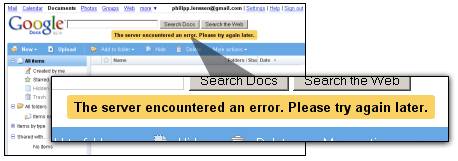
Some Google employees are leaving Google for social site Facebook. Well, “some” isn’t a trend, but a couple of the remarks of those that left offer insightful perspectives. Pedram Keyani, who the Google System blog reported to have left Orkut in favor of Facebok (along with, as of recent times, Justin Rosenstein and Benjamin Ling) says, “I have the same kind of excitement about work that I had early on at Google. I can get lots and lots done and the only thing slowing me down is how quickly I can go.”
I was wondering, what exactly is slowing down some people at Google, and are those factors more than just the price to pay for managing that many employees? Some stuff like Google Presentations was in a bit of an announce-early-release-late kind of mode we are more used to from Microsoft. And at times, internal product evolutions are changed or halted, and another outside service is bought instead (think Google Video, which was replaced by YouTube as Google’s community video hosting site of choice, perhaps being part of the reason why Google Video director Jennifer Feikin left the company in May). Then again, judging from what Google China released just this year, movement is still very fast in at least some departments around the globe. There’s even some downright pirate hacker spirit going over in Beijing HQ, it seems.
Now Valleywag’s Paul Boutin follows up with a quote from Jason McCabe Calacanis at a discussion in front of a crowd interested in Facebook issues. Paul says Jason, the guy who sold blog network Weblogs Inc. to AOL, went into a “Pacino-esque monologue.” Here’s what he said (with some emphasis):
Social networking is second only to chat rooms as being the lowest CPM, the worst place to advertise... that’s not gonna change. And the reason for that – and this has nothing to do with Facebook, MySpace has the same problems – the reason is the content of your friends and family is more compelling than any advertisement will be.
This is why the comments in the last panel were so foolish about it being so competitive to Google, because Google has the greatest advertising in the history of media ever created... which is search advertising. When you type a word into the box, we know what you’re looking for.
When you’re on Facebook, we know you’re looking to meet a girl or a guy, or talk to your friends or your family. It’s a terrible platform to advertise, it always will be. It will always be low CPM, but high page views that make it up in volume. It’s a terrible, terrible way to make money.
Faced with arguments from another panel member that on social networks, you would buy something because someone else said they bought it and that it’s cool, Jason replies, “The holy grail of ecommerce, people have been talking about this forever... and it has not arrived.” Jason adds that the kind of advertising going on at Facebook is also a very low-margin business “nowhere near search inventory."
Then again, back in 1999, even Google didn’t have the best business plan in the world – in fact, they didn’t have any at all, according to statements made by the Google founders back in the days. Here’s ZDNet news in June 1999 (my emphasis):
When asked how the company plans to make money, Google CEO and co-founder Larry Page would only say what they won’t do. They don’t want to become a portal. No content. And they want to avoid competing with other search engines to be the browser of choice for existing portals. In fact, Page said Google doesn’t have any real competitors at all, which may be why they don’t intend to do much marketing.
But even Internet companies, which are almost expected to lose gobs of money, need at least a revenue stream, don’t they?
“We have other ways of making money,” said Page. “You’ll see.”

















































